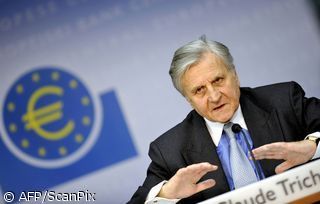Real interest rates mean great returns on the Hungarian forint
Published:
14 April 2004 y., Wednesday
Around the globe, people are looking at Hungary’s real interest rates. With consumer prices up 6.6% year-on-year in January and short-term interest rates close to 12%, there is no other emerging market that offers a better real return on your money.
Massive capital inflows confirm that there is indeed an opportunity. Hot money has pushed up the Hungarian forint to less than Ft 250 per euro. This was the level at which the forint was traded before a flow of adverse macroeconomic data and confused central bank statements drove the currency to its bottom level of over Ft 270 per euro during the second half of 2003.
Is it still worthwhile changing your humble savings into Hungarian forints to benefit from these high interest rates? The answer depends on the exchange rate at which you will convert your money back into your home currency at the end of the day.
Let us suppose you have Ђ100,000 to invest. You can invest it in T-bills from EU countries, giving you a return of around 2%. Alternatively, you change your Ђ100,000 into forints at a rate of Ft 248 and buy Hungarian T-bills for around Ft 24.8 million. This will render you a yield to maturity just below 12%, so that at the end of the year you will own around Ft 27 million.
Provided that you can change your money back into euros at the same rate, you would increase the yield on your investment sixfold compared to investing in euro T-bills! (from 2% to 12%). The problem is that you don’t know the future exchange rate. It is possible, however, to sell the whole amount on the futures market, but only at a rate of Ft 263. Hedging would cost you as much as you would gain from the interest rate differential. Alas, no free lunch.
More interesting returns are available if you’re willing to take a bet on the Hungarian forint. If you’re confident that the forint will stay firm below Ft 263 per euro until the end of December, there is no need to hedge your forint exposure. Is there any reason to be confident about this?
There are, in my opinion, two reasons that make it unlikely that the National Bank of Hungary (MNB) will let the forint depreciate again below a level of around Ft 263 per euro. The first reason is obvious, the second reason more complex in nature.
Šaltinis:
bbj.hu
Copying, publishing, announcing any information from the News.lt portal without written permission of News.lt editorial office is prohibited.
The most popular articles
 The European Commission has authorised under EU state aid rules a €550 million capital injection and a €400 million guarantee in favour of the Austrian bank BAWAG. P.S.K. The Commission found the measures to be in line with EU state aid rules.
more »
The European Commission has authorised under EU state aid rules a €550 million capital injection and a €400 million guarantee in favour of the Austrian bank BAWAG. P.S.K. The Commission found the measures to be in line with EU state aid rules.
more »
 EUROSTAT has reported that the sharpest annual decrease in hourly labour costs of -10.9% was observed in Lithuania in the 3rd quarter of 2009.
more »
EUROSTAT has reported that the sharpest annual decrease in hourly labour costs of -10.9% was observed in Lithuania in the 3rd quarter of 2009.
more »
 Statistics Lithuania informs that, according to the Labour Force Survey data, the number of the unemployed in III quarter 2009 made 228.1 thousand.
more »
Statistics Lithuania informs that, according to the Labour Force Survey data, the number of the unemployed in III quarter 2009 made 228.1 thousand.
more »
 What has come to be termed as the "Great Recession" seems to have come to an end in the third quarter of 2009.
more »
What has come to be termed as the "Great Recession" seems to have come to an end in the third quarter of 2009.
more »
 The European Commission has authorised, under EU State aid rules, a measure adopted by Lithuania to limit the adverse impact of the current financial crisis on exporting firms.
more »
The European Commission has authorised, under EU State aid rules, a measure adopted by Lithuania to limit the adverse impact of the current financial crisis on exporting firms.
more »
 The schedule of Vilnius International Airport (VIA) is supplemented with 3 more new directions; the airline company airBaltic starts regular flights to Paris today, to Munich tomorrow, and to Berlin on Monday.
more »
The schedule of Vilnius International Airport (VIA) is supplemented with 3 more new directions; the airline company airBaltic starts regular flights to Paris today, to Munich tomorrow, and to Berlin on Monday.
more »
 The Governing Council of the European Central Bank (ECB) has decided to start the main construction works for its new premises in spring 2010.
more »
The Governing Council of the European Central Bank (ECB) has decided to start the main construction works for its new premises in spring 2010.
more »
 AB Bank SNORAS was granted the award from NASDAQ OMX Baltic Stock Exchange for the jubilee 15-year listing of the bank’s shares on NASDAQ OMX Vilnius Stock Exchange.
more »
AB Bank SNORAS was granted the award from NASDAQ OMX Baltic Stock Exchange for the jubilee 15-year listing of the bank’s shares on NASDAQ OMX Vilnius Stock Exchange.
more »
 Parex banka has established a subsidiary, SIA NIF, which will professionally manage assets that are not related to the Bank’s core business.
more »
Parex banka has established a subsidiary, SIA NIF, which will professionally manage assets that are not related to the Bank’s core business.
more »
 Mariann Fischer Boel, European Commissioner for Agriculture and Rural Development, today put forward a plan to ensure that Greece will put in place the systems necessary to allow EU aid payments to be made to farmers.
more »
Mariann Fischer Boel, European Commissioner for Agriculture and Rural Development, today put forward a plan to ensure that Greece will put in place the systems necessary to allow EU aid payments to be made to farmers.
more »